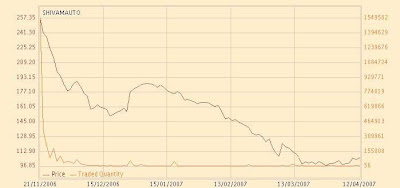There is this company - Shivam Autotech- which was recently listed on the stock exchanges. This company emerged out of a scheme of arrangement proposed by Munjal Auto Industries.
Here is the stock price chart of the Shivam Autotech since it listed:

As the above chart shows, the stock price has fallen significantly post-listing - this is a very common phenomenon.
Anyway, while going through the scheme of arrangement, Ankur came across the following text:
"All the equity shareholders of the transferor company shall be issued 1(one) equity share in transferee company and 1(one) equity share in transferor company in lieu and substitution of 2 (two) equity shares held by them in the transferor company as on the record date fixed by the transferor company. Those shareholders holding the Shares in physical form shall get shares in the physical form and those holding in Demat shall be credited in Demat form. Fractional entitlements arising out of the aforesaid shall be consolidated and sold through market operations and proceeds will be donated to the Prime Minister Relief Fund." [Emphasis mine]
Unbelievable, isn't it?
If you owned odd number of shares in the transferor company, the sale proceeds of your fractional entitlements ended up with India's Prime Minister. Neither did you get the shares, nor did you get the sale proceeds! A wonderful example of altruism isn't it?
I am reminded of another scheme of derangement which was implemented several years ago. Godrej Industries, with the help of very helpful lawyers (whose bread I eat, his song I sing) drafted a scheme which enabled the company to buy back shares from minority stockholders at Rs 18 per share - a rather low price in relation to underlying value, as subsequent events would prove.
The interesting thing about this scheme of derangement was that it had negative consent embedded in it - if you were a minority stockholder in Godrej Industries on record date, the company would take away your shares and send you a check for Rs 18 per share, unless you opted out of the scheme by a specified date. And if you were holidaying on date or forgot to open your mail, or opened it a bit late? Well, thats just too bad!
The Godrej Industries case went all the way to India's Supreme Court and the Court ruled that one share is one vote and if the body of shareholders has passed the scheme, then the court sees no reason for intervention. The company, backed by the Court judgment went ahead with the buyback. That same stock today quotes at Rs 976 (after adjusting for a stock split).
So much for shareholder democracy i.e. all shares are created equal. But, as these schemes of derangement show, some shares are "more equal" than other shares...